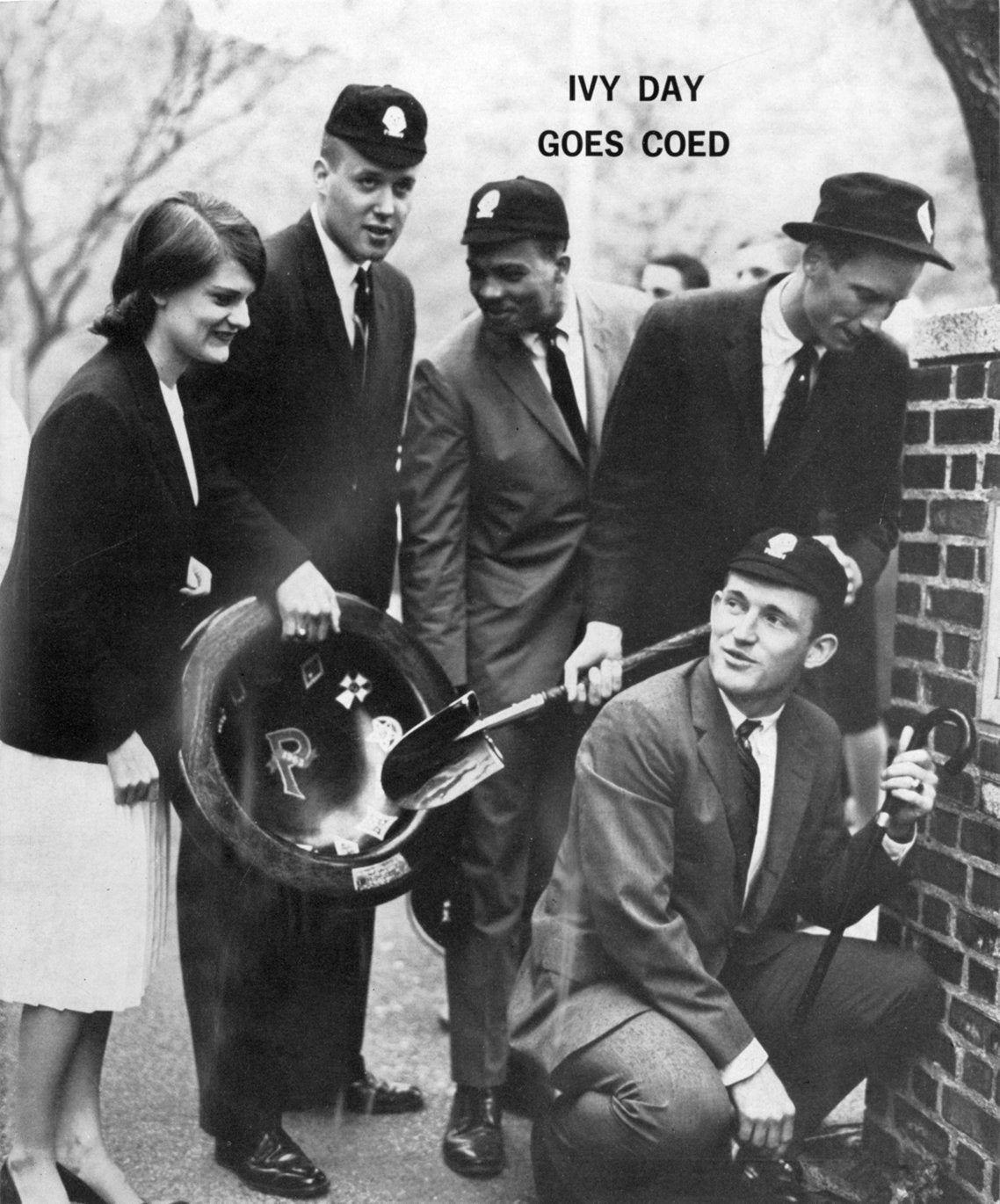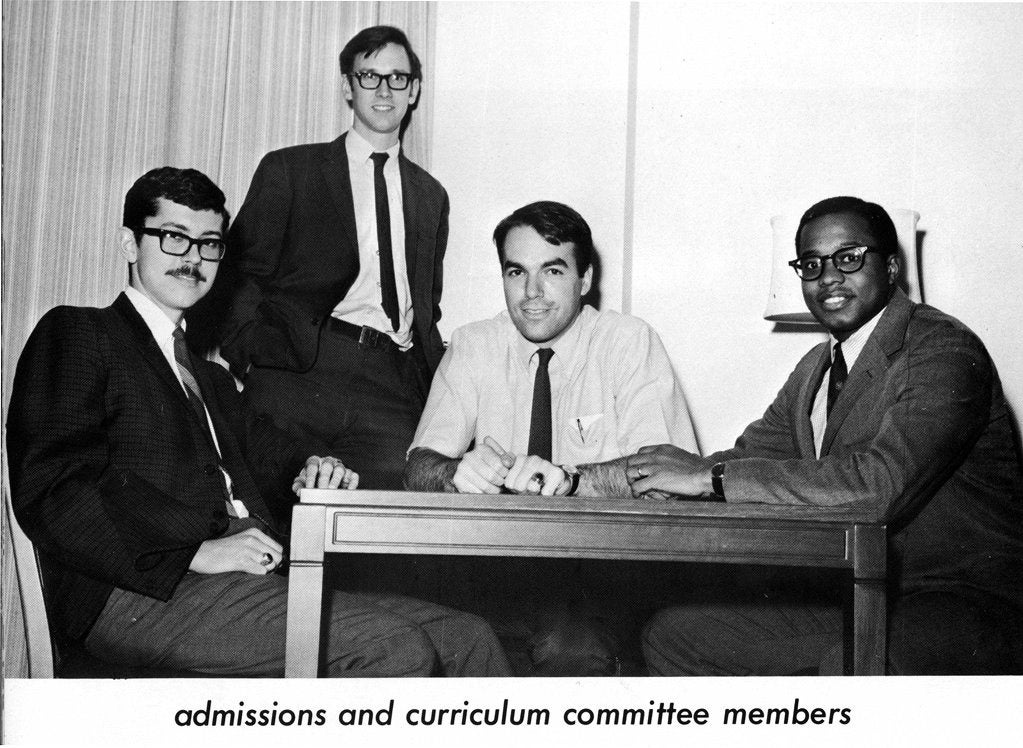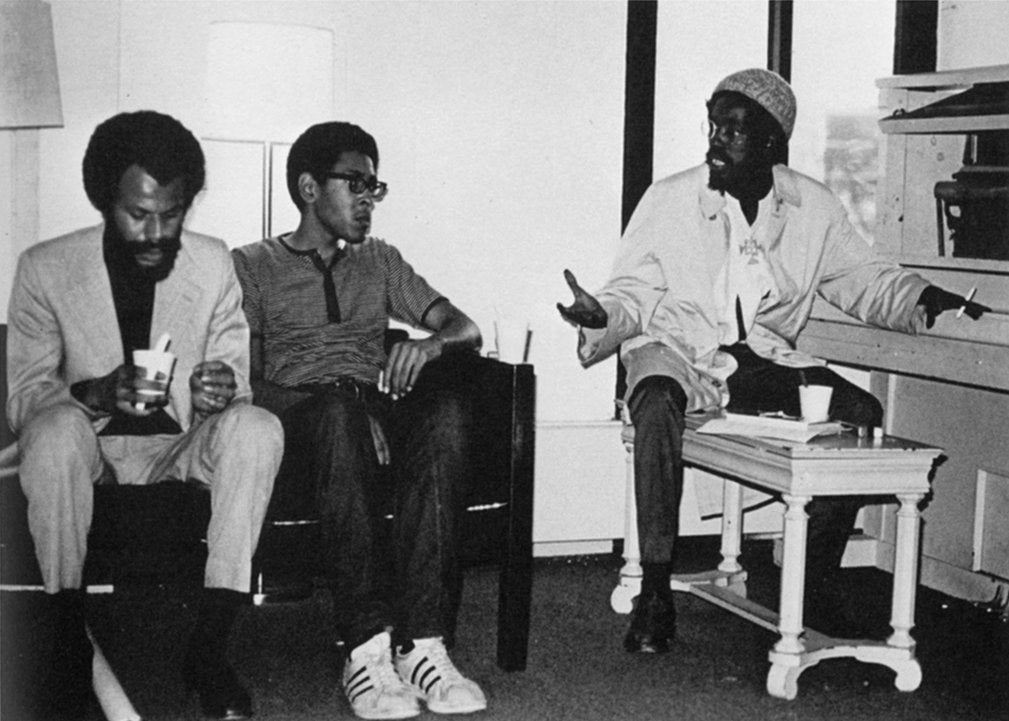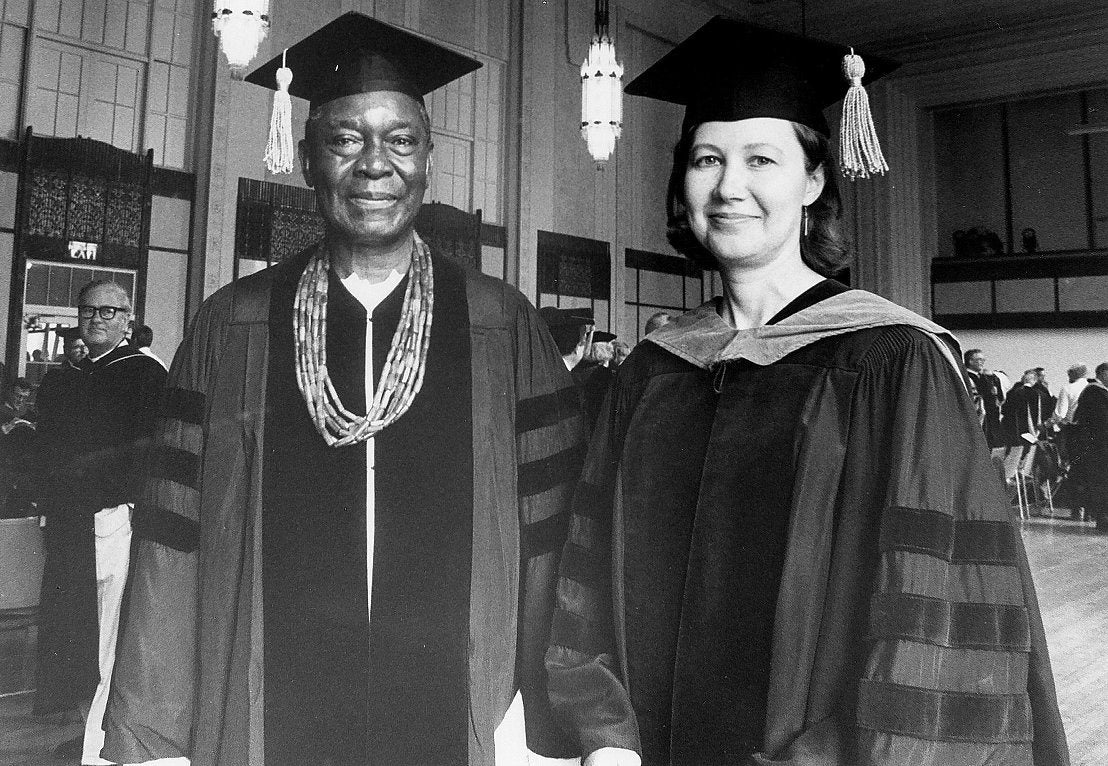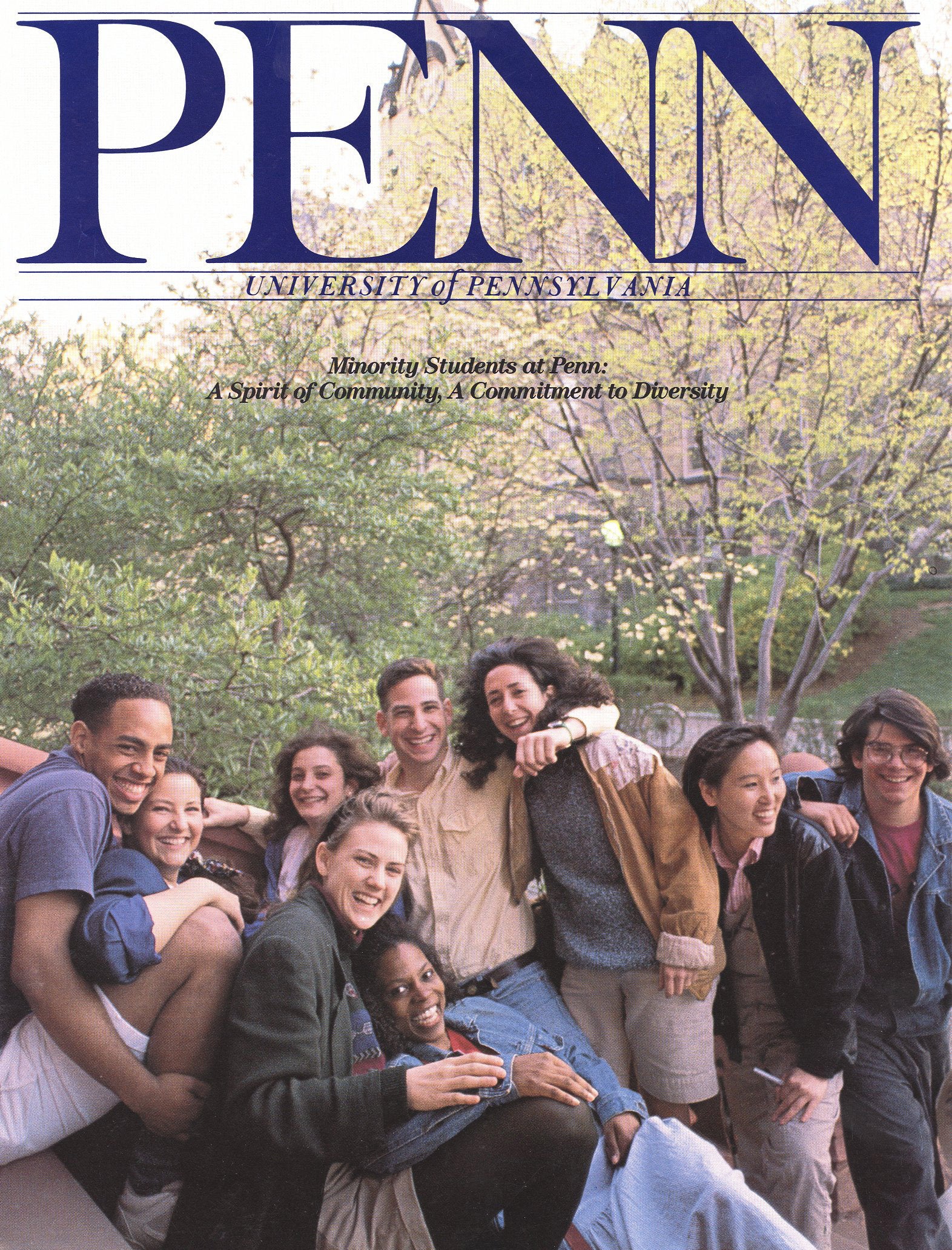“[The committee] does subscribe to the notion that a major part of the total educational experience of a university student is found in the interchange of ideas with other students and the mingling of cultures represented within the student body. Thus, it believes that diversity of student background is a positive educational value and should be actively pursued, even at the expense of other desirable attributes. The admission policy of the University should be designed to produce a student population having the highest possible diversification as to (1) intellectual interests, (2) special talents, (3) social and economic background, and (4) cultural characteristics. The social, economic, and cultural homogeneity of the present student body is a source of some concern to the Committee, and some of the subsequent recommendations of this Report reflect this concern,”
“Admissions Policy for the Undergraduate Schools of the University of Pennsylvania,”
Chaired by Dan M. McGill,
1967
| 1967 | Penn adopted an “Admissions Policy for the Undergraduate Schools of the University of Pennsylvania,” chaired by Dan M. McGill, thereby committing the University for the first time to increased recruitment, retention, and promotion of minority students, faculty, administrators, and Trustees. |
| 1968 | Judge A. Leon Higginbotham was elected the first African American trustee.
To attract minority students the Admissions Office hired the first minority recruiter at Penn. By 1972 an official Minority Recruitment Program was created. Theodore Hershberg was selected to teach “The Negro in America,” the History Department’s first course in African American History. Previously Hershberg had taught “Controversial Topics in Negro History” as an experimental seminar program. Penn recognized the Society of African and Afro-American Students (S.A.A.S) as an accredited student organization, stating “The University consistently encourages the exchange of ideas not only within the formal curriculum but in a variety of situations outside it. It has long been its practice to make accommodations available, whenever possible, for discussions of intellectual, social or political subjects of mutual interest.” |
| 1969 | During the spring semester the History Departments offered a new course: “Black History.”
The International Affairs Association held a “National Conference on Student Political Power” at Penn with 25 student leaders from 14 countries. The goal of the conference was to attempt “to asses the nature and direction of student unrest throughout the world.” The College stated in a ‘Report of The Committee on the Goals of Higher Education on Programs for Black Students and Afro-American Studies,’ “The College already has several ‘area studies’ programs in operation, such as Latin American Studies, American Civilization, Oriental Studies and South Asian Regional Studies. We recommend that a major program in Afro-American Studies be offered as soon as possible, specifically, in time for students in the class of 1972 to utilize it.” |
| 1970 | John Wideman (B.A. 1963), Penn graduate and Associate Professor of English, was appointed chairman of the Black Studies Committee and Director of the Afro-American Studies Program. |
| 1971 | A news release announced, “University of Pennsylvania president Martin Meyerson names James H. Robinson to the newly created position of Equal Opportunity Administrator at the University….Mr. Robinson will be responsible for preparing and maintaining a University Affirmative Action Plan to ensure equality for women and for members of minority groups. He will also assist various departments in preparing Affirmative Action Plans of their own, and will monitor the implementation and execution of the departmental plans as well as the overall University Affirmative Action Plan.”
The Daily Pennsylvanian reported the Sphinx Society will become co-ed. A “Garden of Trees” was planted at Penn’s Hillel House, the first Hillel Foundation “to respond to the needs of Israel for land reclamation, reforestation, beautification and protection around the city of Jerusalem.” |
| 1972 | DuBois College House opened as an experimental living-learning program for African American students at the same time the Afro-American Studies Program began.
The Minority Recruitment Program was officially recognized. The student group MEChA was formed at Penn: El Movimiento Estudiantil Chicano de Aztlan. MEChA focused on the recruitment and retention of Mexican-American students as well as providing cultural events throughout the year. |
| 1974 | In a statement on Support Services for Minority Students at Penn, “…Nevertheless, the principal purpose of providing supportive services should be to provide expanded educational opportunity for disadvantaged students, and the principal goal of any program ought to be to maximize retention and graduation and to minimize attrition of those students who are admitted to the University.” |
| 1975 | A Culture Studies Program was created with a variety of classes focused on India; similar courses on Germany and China were to follow.
The Onyx Senior Honor Society was created to honor African American members of the Senior Class. The Society was (and is) co-ed, with nine women represented out of the first twenty-four members. |
| 1977 | Beatrice Smith completes the Reserve Officers Training Corps Program (ROTC) at Penn. She was the first African American to complete the program at Penn and out of the Ivy League schools the second to receive a commission through Army ROTC. |
| 1978 | Judge A. Leon Higginbotham was elected a trustee for life.
Sheryl George-McAlpine founded the United Minority Council. |
| 1980 | Throughout the 1980s the Christian Association (CA) organized “Central America Week at Penn.” The CA sought to honor a missionary, Oscar Romero, killed in El Salvador.
The African American Studies program held their 6th annual spring symposium addressing “New Black Middle Class Prospects” at the International House. Speakers included Toni Morrison, Frank Yerby and Harvard Professor Martin Kilson. |
| 1983 | Edwin Meese, presidential counselor, and Wharton School Dean Russell E. Palmer were honored in Washington, DC at a ceremony promoting the LEAD Program. LEAD is described as “a pioneering attempt to strengthen minority enrollment in the nation’s leading business schools.” In the program, talented minority high school students are exposed to business curricula during the summer, to encourage them to pursue business education at the collegiate level. Penn was the first business school to participate and was soon followed by Northwestern, University of Michigan, Columbia, University of Maryland, University of Virginia, and the University of California at Los Angeles.
Wharton hosted a conference on how to increase private enterprise in Africa. “The University of Pennsylvania’s Wharton School will host the first known conference of U.S. and African academic, business and government figures designed to promote the private sector, and especially small business development, in Africa.” A number of participants attend, including: US Congressman William Gray III; His Excellency Edem Kojo, former secretary general of the Organization of African Unity; Wila d. Mung’ Omba, president of the African Development Bank; His Excellency Siteke Mwale, special assistant to the President of Zambia for regional cooperation; and His Excellency Marcelle Cross, Minister for International Cooperation, Guinea. “The Symposium on Economic Conditions and Developments in Africa, coordinated by Wharton’s Entrepreneurial Center, will explore bilateral policy development by the U.S. and African states to promote strong economic partnerships and strategies consistent with the African conditions, according to Professor of Management Edward Shils, director of the Entrepreneurial Center. The conference is an activity of the new Wharton-Africa Entrepreneurial Project, directed by A. Romeo Horton and Edward Willis. Horton, a senior consultant at Wharton, is former Liberian secretary of commerce, and former president and founder of the Bank of Liberia. Willis, a lecturer in entrepreneurial management at Wharton, is currently a State Department consultant on small and medium sized business development in Africa.” |
| 1984 | The Albert M. Greenfield Intercultural Center opened to promote an appreciation of minority contributions to American society and issues concerning minority groups on campus. |
| 1985 | The Harnwell House Latin American Residential Program was started with the goal of “exploring and celebrating Latin American Cultures. LARP fosters an appreciation for Latin American languages, politics, forms of cultural expression, and most importantly a sense of community.”
President F. Sheldon Hackney called for donations to an organization started by former Penn professor and 1969 Nobel-prize nominee in literature, Ezekiel Mphalele, the Council for Black Education and Research. The Council was described as,
|
| 1987 | Penn released a report on Minority Permanence and stated, “In 1978, when undergraduate minority recruitment efforts were intensified, the number of minority students in the entering freshman class was 11.4%. Today it stands at 19.5%, [a] 71% percent increase in less than a decade. During this same period, applications from minority students have jumped from 931 to 2,818, and the number of minority students who are admitted has more than doubled from 524 to 1,140.”
The report continued to outline a number of important programs established to encourage minority achievement, from partnerships with West Philadelphia schools to the following: PENNCAP: University of Pennsylvania Commonwealth Achievement Program, it provides academic counseling, tutorial and referral services to 150 disadvantaged students who are residents of the Commonwealth of PA. The program has a successful history with high retention and graduation rates.
PRIME Program: starting in 8th grade students are offered special courses in reading, math and other subjects along with field trips and various summer opportunities. Additionally all are given college and career counseling. The report notes PRIME has over 3,000 students enrolled. Upward Bound: started in 1979, Upward Bound annually offers 90 high school students or veterans the chance to strengthen their academic skills and learn about the college experience through a campus program. The program has experienced success, evident in high test scores and graduation rates. Furthermore, the report mentions President Hackney’s decision to include race as the subject of a University-wide dialogue through his President’s Forum, a series of lectures and workshops entitled “Color lines: The Enduring Significance of Race.” Notable minority staff employed as of 1987: Houston A. Baker, Jr., Albert M. Greenfield Professor: a nationally acclaimed poet, historian, and critic of Afro-American culture. Dr. Baker was named a Guggenheim Fellow in 1979 and has also received fellowships from the Center for Advanced Study in the Behavioral Sciences, the Rockefeller Foundation Fellowship for Minority Scholars, and the National Humanities Center.
Helen O. Dickens, M.D., the School of Medicine’s associate dean of minority affairs and professor of medicine in obstetrics and gynecology, has been honored for her decades of teaching and research with honorary doctorates from both the Medical College of Pennsylvania and the University of Pennsylvania. In recent years, Dr. Dickens has focused her work on pregnant teenagers and the issues that they and their medical providers must confront. Howard E. Mitchell, UPS Professor of Human Resources and Management in the Wharton School, has devoted much of his scholarly attention in recent years to the study of the management of human resources in urban transportation. Dr. Mitchell was appointed Scholar-in-Residence at the Rockefeller Foundation Study Center in Bellagio, Italy in 1980. |
| 1989 | The Black Wharton Undergraduate Association held its first forum on the ‘Political Ramifications of Black Economic Development’ (March 22). The forum was designed to facilitate a discussion on issues facing the African American community and African American business professionals. |
